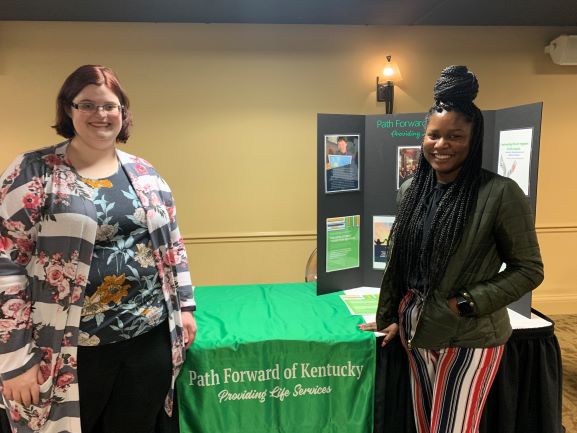In this edition of our employee spotlight, we would like to introduce our two case managers: Teresa Lonkard and Breanna Burton. Teresa and Breanna focus on advocacy for each individual they work with and ensure teamwork and continuity of quality of care for everyone on their caseloads. Their passion for helping others shines through in their work every day, as they assist others to achieve their goals and dreams. Here is what their journey has meant to them in their own words:
Teresa Lonkard
My best friend, Sean, has a rare form of Cerebral Palsy wherein he is primarily wheelchair bound, but has no cognitive symptoms. We met in college and he now does computer security for a large insurance company. Throughout college and afterwards people would often assume I was his girlfriend or care provider and direct questions towards me. They were usually surprised when Sean responded or when they found out I was just a friend. Though being friends with him, and his twin brother, who has a mild intellectual disability, I learned a lot about a population I rarely interacted with and started seeing individuals as more than just their appearance. After about two years of being friends with Sean, I didn’t see or think about his disability. I once turned around to tell him to hurry up when I was going up some steps because I forgot he wasn’t able to follow me and had to wait for the elevator. He told me it was both hilarious and one of the biggest compliments he could ever receive.
I’ve been working in the human services field for almost 4 years (since June 2015). I started by working as a Mental Health technician at Our Lady of Peace. It could be a tough job, but without working there, I don’t think I would love or be as successful as a case manager. I love advocating for my clients, solving problems and finding ways to maximize services. It means a lot to me that I’m just one person, but can start a chain reaction of improvements in someone’s life.
Seeing a client, who developed anorexia, for the first time after he started receiving behavior supports, has been the most memorable moment I’ve had since being in their field. This client has recently been hospitalized due to how much weight he had lost. After working with his behaviorist for a few weeks, he was already began to change his habits. He looked much healthier, happier and said he felt better than he had in the past few months.
Through this line of work, I’ve learned to see what people are capable of, not just what they are currently doing. Since many clients struggle with effective communication I’ve become more observant of body language and am a better communicator. I always try to ensure I understand specifically what a client wants/thinks along with the rest of the team through re-phrasing statements and questions. This has also helped me in my everyday life, as I can often find a way to explain something in a way everyone can understand regardless of his or her level of functioning. I’ve also gained knowledge of the Medicaid and Social Security systems and benefits, which I’ve been able to utilize when I speak with my friends or family members who have disabilities or are unsure for what benefits they qualify. I’ve been able to assist individuals outside of work with locating information and providing resources/guidance concerning benefits.
Breanna Burton:
To me, being a service provider is a big deal. It’s about meeting people’s needs and promoting overall quality of life for the people you work with. No matter what population you’re working with, being a service provider means devoting your days to helping people who need support. To be a service provider means you need to have passion and it should not be taken lightly. I’ve been working in the human service field for the past four years and it has been the most rewarding four years of my life.
I have so many favorite moments since being in the human service field but the most memorable would have to be when one of the consumers I was providing community living support services for texted me months after I stopped working with him to show me that he passed his drivers’ permit test. I had been working with him for a year and we spent a lot of time together studying for his drivers’ permit test. He took it a few times and kept failing by one or two points. When I saw that he finally passed, I was so happy for him and it warmed my heart knowing that he made it a point to share his good news with me although we hadn’t talked or seen one another in a few months.
Everyone’s life is different. Everyone has a story. Each person’s life events, from the day they were born to the age they are now, has shaped them into the person they are today. Show compassion and be intentional about your everyday interactions with others. You never know how much impact you can make on someone’s life.
